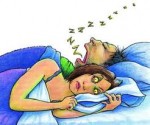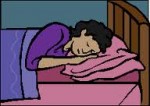 Office workers with more light exposure at the office had longer sleep duration, better sleep quality, more physical activity and better quality of life compared to office workers with less light exposure in the workplace, reports a new study from Northwestern Medicine and the University of Illinois at Urbana-Champaign.
Office workers with more light exposure at the office had longer sleep duration, better sleep quality, more physical activity and better quality of life compared to office workers with less light exposure in the workplace, reports a new study from Northwestern Medicine and the University of Illinois at Urbana-Champaign.
The study highlights the importance of exposure to natural light to employee health and the priority architectural designs of office environments should place on natural daylight exposure for workers, the study authors said.
Employees with windows in the workplace received 173 percent more white light exposure during work hours and slept an average of 46 minutes more per night than employees who did not have the natural light exposure in the workplace. There also was a trend for workers in offices with windows to have more physical activity than those without windows.
Workers without windows reported poorer scores than their counterparts on quality of life measures related to physical problems and vitality, as well as poorer outcomes on measures of overall sleep quality and sleep disturbances.
The study was reported in the Journal of Clinical Sleep Medicine in June.
“There is increasing evidence that exposure to light, during the day --particularly in the morning -- is beneficial to your health via its effects on mood, alertness and metabolism,” said senior study author Phyllis Zee, M.D., a Northwestern Medicine neurologist and sleep specialist and member of the Women's Health Research Institute Leadership Council.. “Workers are a group at risk because they are typically indoors often without access to natural or even artificial bright light for the entire day. The study results confirm that light during the natural daylight hours has powerful effects on health.”
- See more at: http://www.northwestern.edu/newscenter/stories/2014/08/natural-light-in-...

 Your spouse or partner says your snoring is driving him nuts. You wake up feeling unrested and irritable.
Your spouse or partner says your snoring is driving him nuts. You wake up feeling unrested and irritable. A surprising new strategy for managing your weight? Bright morning light!! A new Northwestern Medicine®
A surprising new strategy for managing your weight? Bright morning light!! A new Northwestern Medicine®  Recently, I've been having very detailed dreams related to work that include problem solving (unfortunately, they are not just fun fantasies!). I've actually wondered if these dreams are some sort of mechanism that comes with aging. Lo and behold, today I ran across a NIH article, How Snoozing Strengthens Memories (through dreams) that may shed some light on this phenomena. Here is part of the article:
Recently, I've been having very detailed dreams related to work that include problem solving (unfortunately, they are not just fun fantasies!). I've actually wondered if these dreams are some sort of mechanism that comes with aging. Lo and behold, today I ran across a NIH article, How Snoozing Strengthens Memories (through dreams) that may shed some light on this phenomena. Here is part of the article: Staying up late every night and sleeping in is a habit that could put you at risk for gaining weight. People who go to bed late and sleep late eat more calories in the evening, more fast food, fewer fruits and vegetables and weigh more than people who go to sleep earlier and wake up earlier, according to a new Northwestern Medicine study.
Staying up late every night and sleeping in is a habit that could put you at risk for gaining weight. People who go to bed late and sleep late eat more calories in the evening, more fast food, fewer fruits and vegetables and weigh more than people who go to sleep earlier and wake up earlier, according to a new Northwestern Medicine study. Working mothers are two-and-a-half times as likely as working fathers to interrupt their sleep to take care of others.
Working mothers are two-and-a-half times as likely as working fathers to interrupt their sleep to take care of others. The millions of middle-aged and older adults who suffer from insomnia have a new drug-free prescription for a more restful night’s sleep. Regular aerobic exercise improves the quality of sleep, mood and vitality, according to a small but significant new study from Northwestern Medicine and the Feinberg School of Medicine. Insomnia is more prevalent in women.
The millions of middle-aged and older adults who suffer from insomnia have a new drug-free prescription for a more restful night’s sleep. Regular aerobic exercise improves the quality of sleep, mood and vitality, according to a small but significant new study from Northwestern Medicine and the Feinberg School of Medicine. Insomnia is more prevalent in women. All living organisms have a circadian clock, sometimes called a biological clock, that is an important part of maintaining optimal health. The circadian rhythm is a roughly 24-hour cycle in the biochemical, physiological, or behavioral processes of living things. Although circadian rhythms originate from within our bodies, they are synchronized to the environment by external cues, including the day-night cycle caused by the Earth's rotation. Researchers are looking more closely at the role circadian rhythms play in the development of diseases such as breast cancer and also how factors such as hormones affect this biological clock.
All living organisms have a circadian clock, sometimes called a biological clock, that is an important part of maintaining optimal health. The circadian rhythm is a roughly 24-hour cycle in the biochemical, physiological, or behavioral processes of living things. Although circadian rhythms originate from within our bodies, they are synchronized to the environment by external cues, including the day-night cycle caused by the Earth's rotation. Researchers are looking more closely at the role circadian rhythms play in the development of diseases such as breast cancer and also how factors such as hormones affect this biological clock. The most recent statistics on the women who participate in our
The most recent statistics on the women who participate in our 
